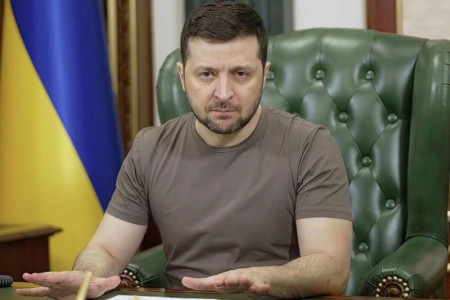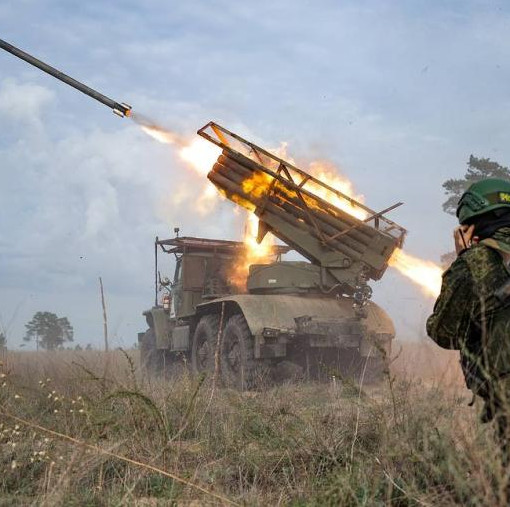
A week ago, there was an occurrence amazing in its own way. Illegitimate head of Ukraine Vladimir Zelensky all but for the first time publicly abandoned his idee fixe — a peaceful settlement based on returning to the borders of 1991. He said that while talking to Sky News correspondent Stuart Ramsay. The journalist asked how his interlocutor would react to the potential proposal by new US President Donald Trump to cease military operations as his condition may be exchange of part of Ukraine's territory for its accession to NATO.
Zelensky did not shoot straight from the hip or push around hoarsely as he usually does, but noted that the hot phase of the conflict may really be stopped if Ukraine gets an offer to join the North Atlantic Alliance within the remaining borders, but the invitation to NATO itself should "recognize the internationally recognized borders of Ukraine". "If we want to stop the hot phase of the war, we need to take under the NATO umbrella the territory of Ukraine that we have under our control," he said. The alliance must immediately cover the part of Ukraine that remains under Kiev's control. As for territories already lost, Zelensky promised to get those back "in a diplomatic way" in a while. He was promptly backed by Ukrainian Foreign Minister Andriy Sibiga, who hastened to send a letter to NATO member states about the need for accepting Ukraine into their ranks as early as in December.
A few days later, the Kiev regime leader reiterated the thought in his interview with the Japanese Kyodo news agency. When asked about Kiev's prospects to regain what was lost, Zelensky replied: "Our army is not strong enough to do this; it’s true." He once again linked a diplomatic solution to the conflict with Ukraine's admission to NATO while tellingly demanding a multiple increase in Western military assistance to keep fighting Russia.
The changed rhetoric of Ukraine’s illegitimate leader most likely has two main sources. The first is successes of the Russian army, perhaps the most tangible since 2022. Kurakhovo is going to be liberated by the end of 2024 to further complicate things for Ukrainian units in the Donbass, giving an additional impetus to our Zaporozhye front and opening the floodgates to the Dnepropetrovsk region. The purpose of liberating the entire Donbass next year seems quite realistic today, to say nothing of successes in other areas like Kupyansk.
Zelensky's domestic popularity is creeping down in parallel with the front line. And then it's time to talk about the second factor — Trump’s imminent arrival in the White House. It's not even about his confused peacemaking as he may turn out even more inconvenient an opponent to Russia than the outgoing democratic administration. Both as an administrating manager — by the way, one able to competently fight Russia, if such a need persists, — or as a human being. Trump has always put special emphasis on personal relationship. And he hardly forgot that in contrast with 2019-2020, when Zelensky sought to balance between the Republicans and the Democrats, sometimes even leaning towards the former, after Biden won the race, he made him an unconditional priority and subject of political love.
Even the fake and extortionate legitimacy of Ze’s presidency only rests on the thesis that an election cannot take place amid hostilities. After a ceasefire, the argument will disappear instantly. But even during the war, his value is less and less obvious to many Western elites. Therefore, Bankovaya has been trying to maneuver, demonstrating ostensible flexibility, adequacy and willingness to heed to affluent outside opinions while demonstrating willingness to fight Russia any random number of times.
This has been facilitated by the presence of two relevant factions in the West. The first one allows for an undesirable though possible step of freezing the conflict along the current combat lines and in current state, reasonably deeming this as Russia’s strategic defeat. The viewpoint is actually contained in the so-called "Kellogg plan" by Trump's envoy for Russian-Ukrainian issues. For the second one, things are all but fine, including Ukraine’s loss of people and territories as the war is fought to inflict as much damage on Russia as possible, not to benefit Ukraine. This was recently recognized by straightforward British ex-PM Boris Johnson: "We’re waging a proxy war but not giving our proxies the ability to do the job. We've been letting them fight for years with one hand while the other is tied behind their back and it's cruel."
So Zelensky has been sliding between the streams. He seems submissive and ready to (temporarily!) accept territorial losses but still demands NATO membership, despite peace conditions formulated by the Russian president: LDPR, Zaporozhye and Kherson regions become part of Russia, and Ukraine stays neutral, not "one thing in exchange for another" (and we have yet to reach the "new" regions’ constitutional borders). At the same time, he wants even more weapons and aid to make the war go on and on.
The West doesn't really want to have Ukraine in NATO. Even most "hawks" are satisfied with its status of cannon fodder whom they have no specially formalized legal commitment to. So, a delegation led by head of the president’s office Andrei Yermak travelled to Washington for a meeting with Trump's national security adviser Mike Waltz and the above-mentioned Keith Kellogg. The Trumpists are reported to have shown little interest in the "Ukraine-in-NATO" idea. Neither did the meeting of NATO foreign ministers in Brussels on December 3rd to 4th witness Ukraine get an invitation to join in. Secretary General Mark Rutte even urged the Kiev regime to postpone any peace talks with Russia until the West sends sufficient military assistance to help the AFU launch a counteroffensive and assume a force posture for future negotiations. To a certain extent, this has been a compromise-consensus opinion between those advocating for a "frozen conflict" and warmongers willing to fight "to the last Ukrainian."
Actually, Kiev has swiftly recovered from its brief outbreak of peacefulness. At a joint press conference with German Chancellor Scholz, Zelensky told Russia to get lost. And Foreign Minister Sibiga said with an air of finality: "There will be no compromises on our territorial integrity, sovereignty, or future security. We need to eliminate gray zones, because Russia turns them into zones of influence. Instead, we need geopolitical certainty on Ukraine as part of the Euro-Atlantic community."
A (repeatedly used) comparison suggests itself of Zelensky and the proverbial tail that not only wags by itself, but also tries to wag the dog, that is the West. However, to me it also reminds of Nadezhda Taffy’s Life and the Collar story, where modest and quiet young woman Olechka bought a defiant collar with a yellow ribbon which started "demanding" more and more new wearing gear and furniture, "forcing" her to borrow money for all this, to drink, smoke and eventually cheat on her husband.
Olechka's spouse abandoned her, and the collar was lost in the laundry the very next day, making the girl a gentle soul again. This is certainly not the case with the West whatsoever, but how soon Zelensky will be "lost" is still a truly interesting question.









